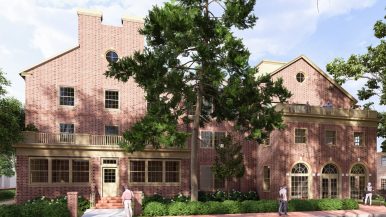After a container ship struck the Francis Scott Key Bridge in Baltimore early Tuesday, causing the bridge to collapse and possibly claiming multiple lives, ships bound for the Port of Baltimore will be diverted to other ports, primarily the Port of Virginia and the Port of New York and New Jersey.
The Virginia Port Authority, which oversees the Port of Virginia, issued a statement Tuesday morning, saying that the container vessel that hit the Key Bridge at approximately 1:30 a.m. Tuesday, called at Virginia International Gateway’s terminal and left March 22 for Baltimore, its next scheduled port of call.
“Our operating team is already working with ocean carriers whose vessels were due to call Baltimore and offering the capability of our port to discharge cargoes as requested,” Port of Virginia spokesman Joe Harris said in a statement. “The Port of Virginia has a significant amount of experience in handling surges of import and export cargo and is ready to provide whatever assistance we can to the team at the Port of Baltimore.”
Danish shipping company Maersk confirmed in an email that it chartered the Dali container vessel — owned by Grace Ocean and operated by Synergy Group — that collided with the Key Bridge. As of 10 a.m. Tuesday, six people who were repairing the bridge at the time of the collision were unaccounted for, according to The Washington Post.
Maryland Gov. Wes Moore said the ship lost power and issued a mayday call shortly before crashing into the bridge, which immediately fell, the Post reported. The ship was traveling at eight knots at the time of the collision, Moore told reporters.
According to an email Tuesday from Rachel Shames, vice president of pricing and procurement for CV International, a Norfolk-based international logistics and transportation company, the collision is expected to create a temporary increase in cargo volume at other East Coast ports, including Norfolk’s terminals.
“The full impacts of this disaster are not yet known, but it’s likely that nearby East Coast ports, including Norfolk, Philadelphia, New York and others will absorb cargo traffic from Baltimore in the short term,” she wrote. “This sudden increase in volume may strain operations at other ports.”
All vessel traffic in and out of Baltimore’s port has been suspended until further notice, Maryland’s transportation secretary announced Tuesday morning, though the port is still open and trucks are being processed within marine terminals.
Maersk sent its customers an email notifying them of the collision and said that due to the bridge collapse, ships will not be able to reach the Baltimore port “for the time being. In line with this, we are omitting Baltimore on all our services for the foreseeable future, until it is deemed safe for passage through this area. For cargo already on water, we … will discharge cargo set for Baltimore in nearby ports. … Delays may occur, as they will need to discharge in other ports.”
“I think there is definitely a concern that we will see some congestion on the East Coast now, because other ports are having to absorb traffic,” Shames said later in an interview with Virginia Business.
She said that the impact of the port’s temporary closing “could end up rippling down to Wilmington, [North Carolina], Charleston [South Carolina] and Savannah, [Georgia],” although, she noted, “Norfolk is probably the most practical place to absorb most of the capacity. You want to keep the cargo that was supposed to go to Baltimore…as close as possible to Baltimore.”
Shames also noted that Baltimore’s port is the top U.S. port for the import and export of automobiles, light trucks, wheeled farm vehicles and construction machinery, which often move on specialized vessels and not in containers.
Earlier this month, widening of the Port of Virginia’s shipping channel was completed, allowing two ultra-large container vessels to pass at the same time. The shipping channels are now up to 1,400 feet wide in some areas, although the completed deepening of the commercial shipping channel and the Norfolk Harbor to 55 feet and the ocean approach, set to be 59 feet deep, has been delayed until fall 2025, the port announced.
David H. Sump, a Norfolk-based maritime attorney with Willcox Savage and a former Coast Guard officer, says it’s too soon to tell what exactly happened to the ship in Baltimore, but after he watched a video of the collision, he noted, “This vessel appeared to lose power. It appeared to go dark for about a minute,” shortly before crashing into the bridge. If there were a power outage on the ship, “you don’t have control of the vessel during that time. It’s floating. The momentum of the vessel was proceeding, [and] there may not have been anything the pilots could have done.”
The Dali, with 22 crew members on board, had made its scheduled import deliveries to U.S. ports and was likely heading back to Asia when the collision occurred. No Maersk crew and personnel were on board the vessel, according to an email from Maersk to customers.
Sump and fellow maritime attorney Deborah Waters of the Norfolk-based Waters Law Firm note that large container ships in Maryland and Virginia are required to have local ship pilots on board when the vessels are moving in and out of rivers, bays or harbors — basically guiding them safely past structures such as bridges or other ships. “Pilots are the expert navigators of the local waters,” Sump said.
Local pilots often require five years of training in Virginia to be licensed to navigate vessels in tighter quarters. Sump acknowledges that ultra-large container vessels stopping at the Port of Virginia’s major terminals — the Norfolk International Terminals and Virginia International Gateway — do not go near or through bridges like the Key Bridge in Baltimore, although ships moving up the James River to the Richmond Maritime Terminal would encounter bridges.
Frank Rabena, vice president of the Virginia Pilot Association, told Virginia Business that this improvement and the port’s other recent infrastructure changes allow the port to assist in a situation like this. “The Port of Virginia is already prepared,” he said. “We are already in that position to handle pretty much any ship that comes our way.”
In terms of local impact, Rabena said, it’s too soon to tell what will happen.
“We’re not sure how shipping companies would reroute cargo,” he said. “That will unfold in the next couple of days.”
In 2022, the Port of Virginia processed more than 3.7 million 20-foot-equivalent units at its terminals, and cargo tonnage was up 11% from 2021. For fiscal 2022, the port generated $124.1 billion in output sales, $41.4 billion in Virginia labor income and $5.8 billion in state and local taxes and fees.



